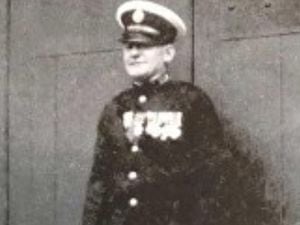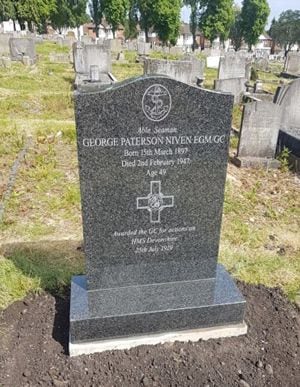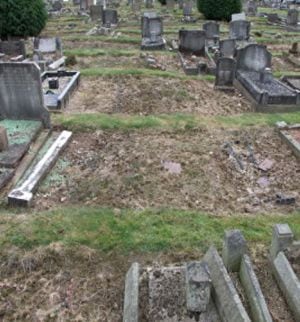Fitting grave at last for George Cross hero
The unmarked grave of a navy hero who won a top bravery award has finally been tidied up and given a headstone thanks to a project led by a Stourport historian and a former soldier.

George Niven braved smoke and flame as he took a leading part in rescue efforts following a devastating explosion which claimed 18 lives on the cruiser HMS Devonshire during a live firing exercise on July 25, 1929.
He was awarded the Empire Gallantry Medal, which in 1940 was replaced by the new George Cross, given for acts of courage in circumstances of extreme danger, and second only to the Victoria Cross.
Mark Green, who runs the www.vconline.org.uk website honouring VC and GC heroes, said: "Ten months ago myself and Steve Davies embarked on a quest to put a headstone on his final resting place in Yardley Cemetery, Birmingham. The grave was derelict and badly neglected.

"We tried without success to find any surviving family and so approached Birmingham City Council and Yardley Cemetery itself. This exercise took a lot of time but eventually we received all permissions in February 2020 and then instructed local firm Loxley Memorials to make the headstone.
"We asked the Victoria Cross and George Cross Association to fund the project and happily they agreed and after 73 years he is now properly remembered.
"Steve is an ex-serviceman in the Royal Green Jackets regiment who is based in the south east of England. Steve has been renovating graves for a number of years and recently has been working on graves of Victoria Cross and George Cross recipients.

"I made contact with him and we made a list of graves we wished to get marked or renovated, and George Niven GC was one of those."
The pair have since traced a granddaughter of Niven living in Australia.
The award of the medal came after an explosion in an 8in gun turret on the cruiser. Able Seaman Niven went into the turret with another man – who also received a bravery award – to help evacuate the victims, as explosive cordite charges burned.
Niven died in Birmingham on February 2, 1947, aged 49, and if his grave was marked 73 years ago, it was not by the time Steve made his first visit to the site.





